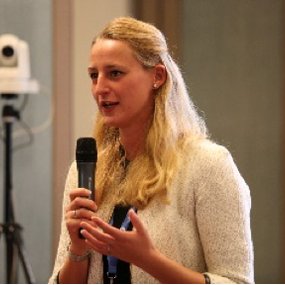Understanding the Urban Built Environment as a Driver for Health and Well-being: Two Talks and a Discussion with Perspectives from The Netherlands and the U.S.
When and Where
Speakers
Description
This seminar will welcome two speakers at the cutting edge of research on exploring the ways cities influence the health and well-being of their residents: Prof. Joreintje Mackenbach (Amsterdam University Medical Centers) and Prof. Marynia Kolak (University of Illinois, Urbana-Champaign). The talks will be delivered jointly, and we hope to have a discussion afterwards about the opportunities and limits of urban built environment research. We welcome students and faculty from all disciplines.
 Transit to Groceries Versus Medication for the Opioid Epidemic: Lessons on the Pluralities of Accessibility
Transit to Groceries Versus Medication for the Opioid Epidemic: Lessons on the Pluralities of Accessibility
Presenter: Marynia Kolak (University of Illinois at Urbana-Champaign – Department of Geography and GIScience)
Abstract: Few resources have received as much attention across scientific, policy, and community spaces as grocery stores (or other food providers) in the past two decades. Access to fresh and affordable produce and healthy foods remains a critical topic, though has matured to consider the many dimensions of accessibility from cost, travel, time, correlations with important structural variables, and more. In this talk, I'll review lessons learned from past work on measuring the influences of food access within Chicago, and how it has been adapted to measuring access to medication for opioid use disorder (MOUD) in the Unites States. Understanding transit behaviors and resource variability across varying degrees of urbanicity are crucial to modeling MOUD needs, though persistent challenges of stigma of resource usage presents a complex challenge for access researchers in this space.
 Urban Food Environments: How Do They Affect Our Health?
Urban Food Environments: How Do They Affect Our Health?
Presenter: Joreintje Mackenbach (Amsterdam University Medical Centers - Department of Epidemiology and Data Science)
Abstract: The consumption of unhealthy diets accounts for 22% of global mortality. By 2030 more than 80% of Europe’s population will live in an urban environment. Urban food environments form a potential context for population-based interventions to improve dietary patterns: everyone is exposed to the food environment, and intuitively we can all relate to the influence that smells, advertisements and high availability of foods have on our food choices. However, epidemiological evidence for the influence on dietary behaviors is not unequivocal. I offer some potential explanations for the inconsistent results observed in the literature, and discuss some of the advancements or nuances that may be needed for this field of research to generate consistent and meaningful results. Finally, I will reflect on the drivers of unhealthy food environments that should be sought in wider food and political systems.
Discussion: moderated by Michael Widener (UofT Geography and Planning)


